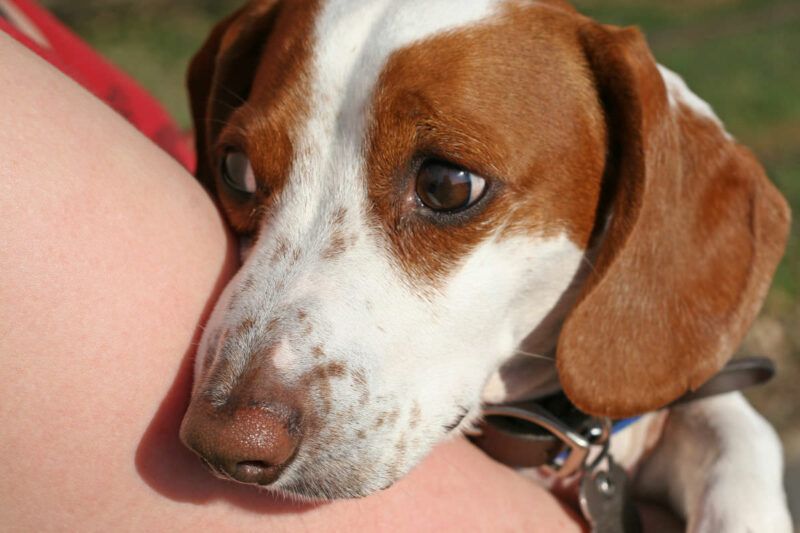15 Signs Your Dachshund is Stressed Out (and What to Do About It)
It’s important to recognize when your Dachshund is stressed.
When your Dachshund is stressed, they may be more likely to run away, training sessions may not be effective, they may be scared, it can lead to submissively peeing, or they may become reactive and act aggressively towards dogs or people.
As humans, we typically only think of negative situations or experiences when talking about stress.
However, it’s important to remember that it is possible for your Dachshund to show stress signals during positive experience, like when they are over-joyed or over-excited.
But just the experience is relatively positive, doesn’t mean that being in an over-aroused and stressed state is good for your dog (that’s up to you to decide).
Since our Dachshunds can’t tell us when they are stressed, it’s up to use to interpret their sometimes subtle behaviors and body language.

When Is Your Dog Most Likely to Be Stressed?
Things that can trigger your dog’s stress fall into 4 general categories – Environmental, Social, Physical, and Emotional.
Times when you should look for signs of stress are:
- In new or unfamiliar situations like a new environment or meeting new people or dogs
- In crowded or busy places
- Around loud noises like the garbage truck, fireworks, or thunderstorms
- When your dog’s owner, or the primary person they are attached to, is out of sight
- When a comfortable routine changes like moving, bringing a new pet into the house, a baby, a death of a pet, or travel
- When they fear getting punished for doing something you disapprove of (no, your Dachshund is not cowering out of guilt)
- When visting the veterinarian or groomer – both arriving and during handling
- Riding in the car – car sickness due to motion sickness or anxiety (how to tell the difference)
- When training sessions are too long
- When people or dogs fight nearby
Keep an eye out for the common signs below if your dog is experiencing anything on this list.
Conversely, if your dog is showing the signs below, that is a good indicator that something is bothering them, so review the list above to see if you can find the cause.
Common Signs Your Dachshund May Be Stressed
Some of the things on this list are sufficient stress signals on their own, but it’s more likely that your Dachshund will show two or more of these signs when they are stressed.
Individually, these signs do not always indicate stress, like in the case of yawning or “shaking it off”.
When signs and symptoms of stress are presented in multiples, it’s easier to recognize you need to intervene.
1) Not eating
If your dog is typically very interested in food but won’t eat their meal, or take a treat when offered, it could be a sign of stress.
This is usually the first sign that my Dachshund’s are stressed since they are obsessed with food.
This was also one of the first warning signs that My Dachshund was experiencing back pain and needed to go to the vet right away.
2) Excessive shedding
Almost all dogs shed to some extent, but if you pick up or pet your dog and find excessive dog hair on your clothes, or in your hand, they may be “ejection shedding” due to stress.
This is also sometimes referred to as “blowing their coat”.
All of my Dachshunds have done this when they’re stressed.
3) Tucked tail
When a dog is happy and relaxed, their tail will be slightly hanging or straight out and gently wagging.
If your Dachshund’s tail is tightly tucked around their bum and between their legs, there is a very good chance your dog is stressed.
My Dachshund Gretel has had anxiety her whole life. Her tail is so used to being tucked, I sometimes, half jokingly, wonder if it’s just stuck that way.
4) Dilated pupils and whale eye
Dilated pupils can be a sign that a dog is feeling threatened, stressed or frightened.
My Dachshund Gretel’s pupils are often dilated and I took her to the vet because I was worried there was something wrong with them.
The vet said that it was likely due to her anxiety – that a dog’s pupils dilate when they are emotionally uncomfortable.
A Dachshund may also turn it’s head a little but keep it’s eye on the trigger, which often exposes the whites of its eyes.
This is called whale eye.
5) Yawning or lip licking
People typically think that yawning means that their dog is tired.
While this could be true, yawning is more typically a way that dogs release stress.
You can usually tell the difference because a stressful yawn is more prolonged and intense than a sleepy yawn.
Stress yawns may also occur multiple times within a short period of time.
Dachshund that are stressed, will also often lick and “smack their lips” repeatedly.
6) Shaking it off
While dogs often shake when they get up from a nap, or after a bath to help dry themselves off, more often than not your Dachshund is shaking in an effort to dissipate the stress they’re feeling.
When I walk in crowded places with my Dachshund, she often stops to shake the stress away.
7) Focusing on something else
If your Dachshund is feeling stressed, they may present what is called “avoidance behavior” or “displacement behavior”.
Displacement behaviors are normal behaviors displayed out of context.
They’re an attempt for your Dachshund to focus on something else besides what they may want to do, like run or bark and snap.
This behavior can also be a signal to the other dog that they aren’t a threat.
For example, your Dachshund may be approached by another dog and they initially sniff each other.
Then, suddenly, your dog looks away and starts sniffing the ground or licking their genitals.
8) Hiding or escape behavior
Your Dachshund is hiding behind you, under furniture, or looking for an escape route, it’s very likely due to stress.
I also see this exhibited as a leashed Dachshund pulling and “pinging” back and forth at the end of the leash.
9) Ears pinned back
A Dachshund’s ears generally hang loosely next to their head when they are relaxed or perk up and rotate forward a bit when they are curious (sticking out kind of like paddles).
But if your Dachshund pulls their ears back (often called “pinning” their ears), it can be a sign of stress.
10) Frozen posture
This one is tricky because Dachshunds are notorious for stopping on a walk and refusing to go on.
In a lot of cases, this can be due to feeling uncomfortable in a harness or jacket but it can be due to fear and stress.
11) Drooling or panting excessively
A Dachshund that pants excessively may start to drool. Or perhaps they foam at the mouth like a Labrador with a ball.
Either can be a sign of stress.
However, do remember that heavy panting and a distended tongue can be an early sign of heat stroke.
12) Trembling or shaking
Dachshunds may shake for many reasons including feeling any amount of cold air on their skin or if their fur is wet and they feel chilled.
But it can also be a sign that they are scared, stressed, or over excited (like when they are anticipating a treat).
13) Whining or barking
Dachshunds are notorious for barking at anything, everything, and seemingly nothing at all.
However, if your Dachshund is barking excessively at a person or object, especially if another stress sign is present, or they have a defensive stance, the barking may be stress related.
14) Changing body posture
A calm, confident Dachshund will generally walk and stand on all 4 legs equally.
If a healthy Dachshund, with no orthopedic problems or mobility issues, shifts their weight to the rear legs or cowers, they could be stressed out by something.
15) Potty accidents
My first Dachshund had separation anxiety and experienced extreme stress when separated from me.
Even if I had just taken him to the bathroom, he would pee on the floor as soon as I left the apartment.
When my Dachshund Summit was a puppy, she was so scared of the vacuum cleaner that she pooped in her crate.
If your Dachshund is urinating or defecating at strange times, or in inappropriate places, it could be a sign of stress.
So what can you do if you see any of these signs?
9 Ways to Alleviate Your Dachshund’s Stress
It’s important to recognize your Dachshund’s stress signals, honor them, and take steps to reduce their stress if possible.
The first step in doing this is to regularly observe your Dachshund’s normal behavior so you will know, for example, if your dog is licking their lips out of stress or because they want a treat.
Once you know your dog’s go-to signs that they are stressed, you will be able to better recognize them and take action.
Here are some ways that you can help to reduce your Dachshund’s stress level.
1) Stay calm
Our dogs pick up on our feelings and emotions.
If you see a situation coming that may be scary for your dog and tense up, they will be more likely to think it’s scary and react.
Conversely, if your dog senses tension, stress, or worry in your body language or voice, it’s very possible that their stress level will increase.
2) Remove the trigger
Removing your Dachshund from the situation that is causing them stress is the best and most important course of action.
If you can’t remove your dog from the situation completely, try distancing yourself from the stressor or upsetting situation.
If your Dachshund is darting back and forth at the end of the leash, or looking like they want to escape, they are trying to distance themselves on their own anyway.
3) Don’t force it
Remember to never force the issue – respect your dog’s feelings and their communication with you.
In an attempt to raise a friendly Dachshund that likes dogs and people, I often see owners encourage direct contact with their dog or force them into the interaction.
I admit I was guilty of this with my first Dachshund. Luckily, he was a pretty easy-going guy.
But I learned better with my second Dachshund who was anxious and reactive.
I saw that forcing her into uncomfortable situations only made her more fearful, anxious, and likely to act out.
4) Redirect your Dachshund
If you can’t put physical space between your Dachshund and the thing upsetting them, sometimes giving them something else to focus on is the next best thing.
You can “mentally separate” your dog from the scary thing by asking them to perform a trick or training command.
If the stressor is entering your home, like a guest or the electrician, try putting your Dachshund in another room and giving them a lick mat or stuffed treat toy to work on.
5) Comfort your Dachshund… or don’t
You may have a strong urge to comfort your fearful or stressed Dachshund by coddling them or picking them up.
But know there is a lot of debate about this in the dog world.
One side claims that you can comfort a fearful dog without reinforcing their fear and the other claims that coddling them will make their fear and stress worse in the future.
I suggest you read more about the debate and decide for yourself.
With that being said, my perspective is more inline with this one that says, “There is absolutely no evidence, not one bit, suggesting that providing comfort and security to a distressed dog causes the dog’s anxiety or fear to increase.”
6) Use a calming supplement
Sometimes taking your dog’s anxiety down a notch or two can help them regain composure and self-sooth during stressful situations.
If I know my Dachshunds will be exposed to a stressor, and it’s unavoidable or something I need them to learn to tolerate, I give them a hemp CBD supplement about 45 minutes beforehand.
7) Exercise beforehand
If you know your will be exposing your Dachshund to a potentially stressful situation, take them for a 30-90 minute (or more) walk beforehand.
A tired dog is less apt to be on high alert for danger and be phased by their surroundings and experiences.
8) Socialize and desensitize them
Prevention can be the best medicine.
For Dachshund puppies, early and consistent socialization can help them overcome stress and fear in the long-term.
Contrary to popular belief, socialization does not mean having your dog meet as many dogs and people as they can.
It’s about slowly exposing them to new, and potentially stressful situations, while ensuring they have a positive experience.
In this way, they become desensitized to possible triggers and more confident around them.
If your Dachshund is more confident, it’s less likely they will be surprised, fearful, and upset by things they encounter out in the world.
It’s still possible to work on creating a calm Dachshund that can handle stressful situations even if they are an adult.
9) Strengthen your bond
A strong bond with your Dachshund means that you and your dog have a close and affectionate relationship characterized by trust and communication.
When your Dachshund trusts you, they are more likely to feel safe with you, even when a stressor is present.
They are also are more likely to look to you for direction when they are feeling unsure or uncomfortable.
When you communicate well, your dog knows you will recognize their cues and help to keep them safe and also knows what your signals mean.
When you and your Dachshund have a strong bond, you will be able to navigate tricky situations better.
Final Thoughts
While not all signs of stress indicate that your Dachshund is having a bad experience, it’s very important to recognize when your dog is feeling stressed or uncomfortable.
Some of examples of stress signals paired with a situation you may want to address are:
- Yawning, lick lipping, and panting when your Dachshund is feeling carsick
- Shaking it off and putting their ears back when in crowded, overwhelming public places
- Ejection shedding and drooling when you visit the veterinarian
- Submissively peeing when approached abruptly
Some ways to help your Dachshund become more confident and overcome stress include staying calm, removing the trigger, redirecting, and preparing for the encounter beforehand.
Intervening when your dog is stressed or needs reassurance can help build their trust in you and help the both of you enjoy each other’s company more.


About the Author
Hi, I’m Jessica. I’ve been studying the Dachshund breed since 2007, owned 3 of my own, and shared in the lives of thousands of others through their owner’s stories. When I’m not sharing what I know on this blog, you can find me hiking, camping, and traveling with my adventurous wiener dogs.
